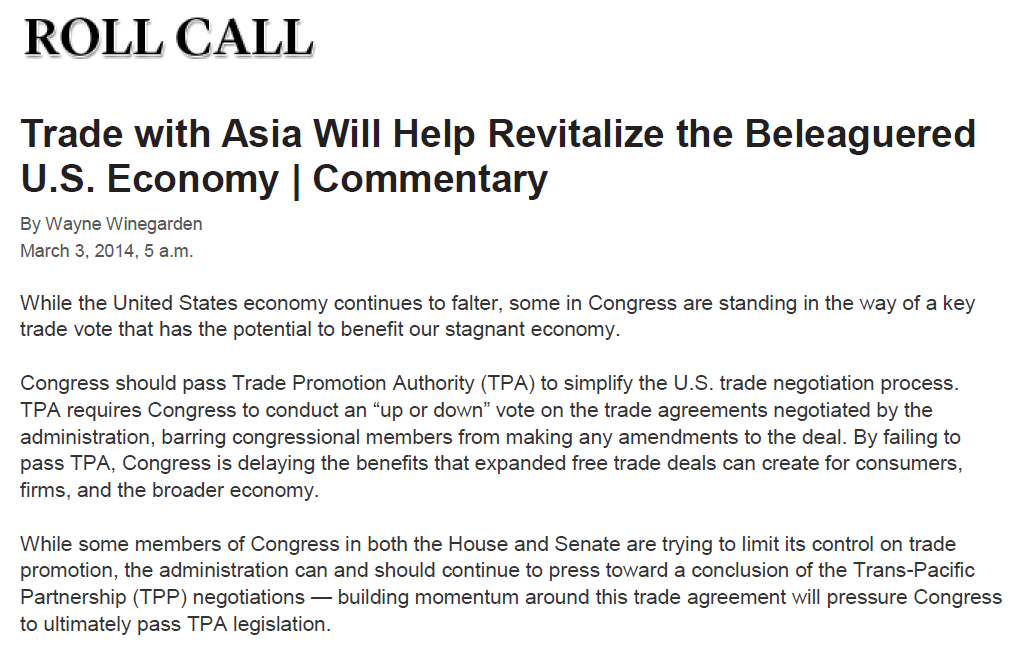By Wayne Winegarden
March 3, 2014
While the United States economy continues to falter, some in Congress are standing in the way of a key trade vote that has the potential to benefit our stagnant economy.
Congress should pass Trade Promotion Authority (TPA) to simplify the U.S. trade negotiation process. TPA requires Congress to conduct an “up or down” vote on the trade agreements negotiated by the administration, barring congressional members from making any amendments to the deal. By failing to pass TPA, Congress is delaying the benefits that expanded free trade deals can create for consumers, firms, and the broader economy.
While some members of Congress in both the House and Senate are trying to limit its control on trade promotion, the administration can and should continue to press toward a conclusion of the Trans-Pacific Partnership (TPP) negotiations — building momentum around this trade agreement will pressure Congress to ultimately pass TPA legislation.
Trade Promotion Authority would put the TPP negotiations — a free trade agreement between the U.S., Japan, Australia, and 9 other Pacific nations encompassing 40 percent of global GDP — on the “fast track” for completion. Ultimately, the TPP has the potential to improve the low-growth economy both for consumers and firms, through benefits such as greater product choice, higher product quality, and more reasonable prices.
Economic growth is fostered by sound money, sensible regulations, tax policies that promote work and entrepreneurship, effective prioritization of government expenditures, and expanding international trade. Each one of these policy areas has been unequivocally anti-growth for many years. Until these policies are changed, the consequences will be more of the same — low economic growth, stagnating incomes, and excessive unemployment.
The TPP has the potential to address one of these areas — expanding international trade. International trade agreements have been stalled for several years now. Successfully concluding the TPP will reverse this negative trend and ultimately help improve the strength of the U.S. economy.
Studies examining the impact on consumers from the free trade agreements signed during the 1990s have found that U.S. households gained around $2,000 to $2,500 in income as a direct result of the expansion of international free trade. TPP can create proportional benefits for consumers today allowing for a wider array of goods and services available at more affordable prices, in addition to the intangible benefits greater competition creates.
Greater innovation is essential for robust economic growth. In the same way that sports rivalries encourage athletes to train harder and expand their performance, competitive markets encourage companies to find new ways to serve their customers better. Competition encourages companies to work harder, innovate, and lower prices all to the benefit of consumers. The companies that fail these tasks risk losing their customers and ultimately risk their survival.
The economic benefits from TPP will go beyond the expanded imports into the U.S. The U.S. exported $2.2 trillion in goods and services in 2012. These exports supported 9.8 million U.S. jobs according to the U.S. Trade Representative.
Two of the largest U.S. export categories are agricultural goods and technology. Both sectors face significant barriers to trade — barriers that TPP will help eliminate. The reduction in these trade barriers through the creation of such a large free trade area provides U.S. exporters with an unprecedented opportunity to increase their sales and open new markets. The potential benefits are particularly valuable to the U.S. because the TPP countries encompass one-third of total global trade today. The volume of this trade will be much higher if TPP is implemented, and we would see a more effective stimulus bill than anything that Congress has passed since the 2008 recession began.
The U.S. needs a jump-start in light of its weak economy, stagnant incomes, and jobless recovery for more than half a decade. TPP creates such an opportunity to help consumers, raise family incomes, and lift the economic malaise that has been plaguing the economy and Congress should not stand in the way.
Wayne Winegarden, who has a doctorate in economics, is senior fellow at the Pacific Research Institute and a contributing editor to EconoSTATS at George Mason University.
Original Source: Roll Call
Click to view PDF


